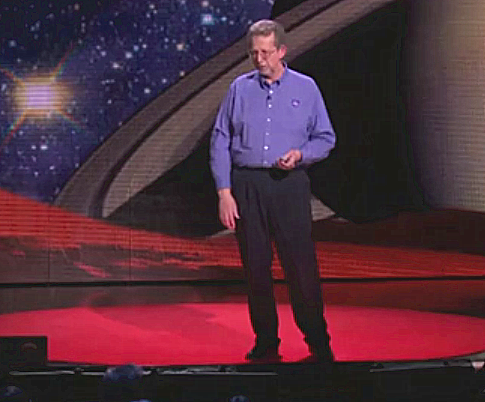Another moon, very similar, is Europa.
另一个非常相似的卫星,木卫二。
Galileo visited Jupiter's system in 1996 and made fabulous observations of Europa.
伽利略号在1996年时探访了木星系统,对木卫二进行了详细的观察。
Europa, we also know, has an under-the-ice crust ocean.
我们知道木卫二拥有存在于冰层下的海洋。
Galileo mission told us that, but we never saw any plumes.
伽利略号告诉了我们这些,但我们从未看到过任何的片状水。
But we didn't look for them.
因为我们从未找寻过它们。
Hubble, just a couple years ago, observing Europa,
哈勃望远镜,就在几年前观察木卫二时,
saw plumes of water spraying from the cracks in the southern hemisphere, just exactly like Enceladus.
看到了片状水,它们从南半球的裂缝中喷洒出来,就跟土卫二一模一样。

These moons, which are not in what we call a traditional habitable zone,
这些卫星不在我们称作传统宜居地的区域,
that are out in the solar system, have liquid water.
而在太阳系更远的地方却拥有着液态水。
And if there are organics there, there may be life.
如果那里有有机物的话,那里就可能有生命。
This is a fabulous set of discoveries
这是一系列绝佳的发现,
because these moons have been in this environment like that for billions of years.
因为这些卫星已经在这样的环境中存在了数十亿年。
Life started here on Earth, we believe, after about the first 500 million, and look where we are.
我们相信地球上的生命开始于地球形成5亿年之后,看看现在的我们(进化的程度)。
These moons are fabulous moons.
这些卫星让人难以置信。












